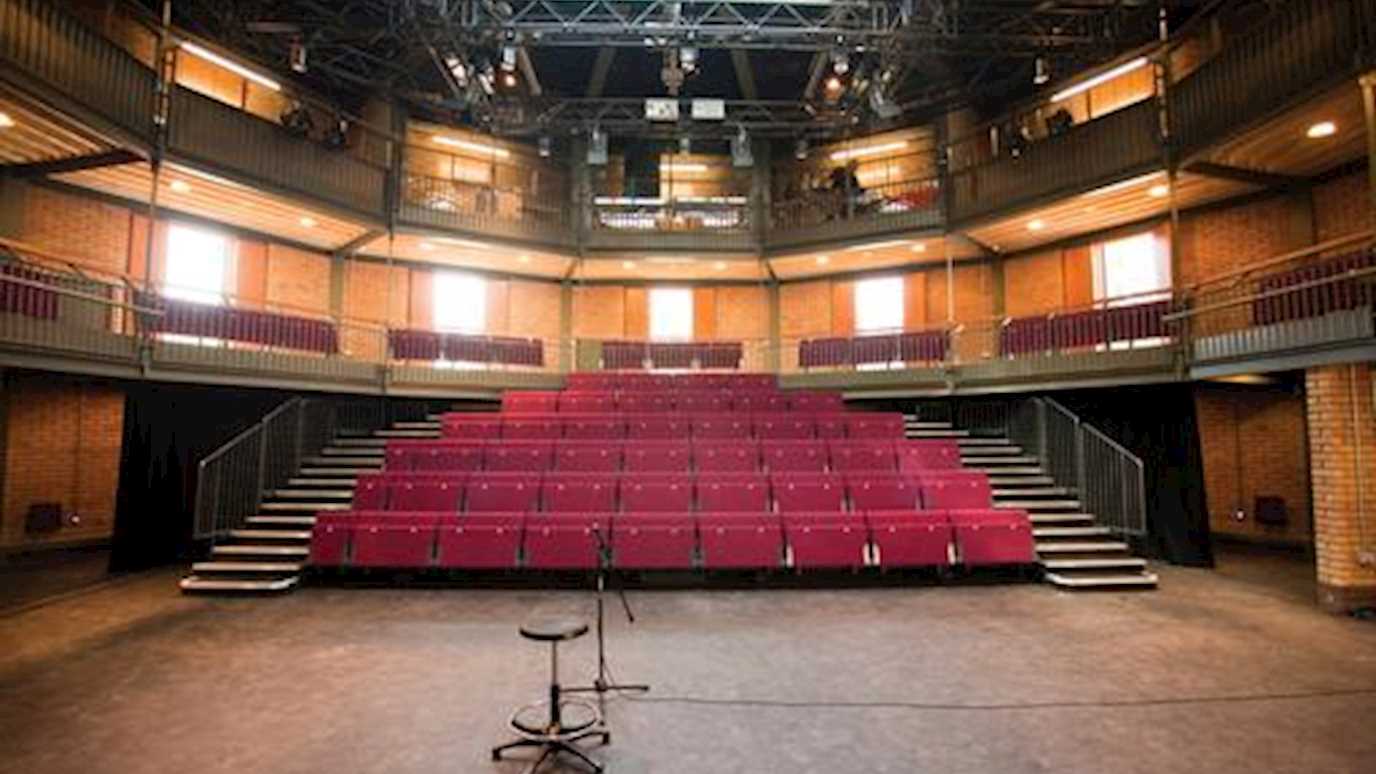Key information
Duration: 3 years full time or 6 years part time
UCAS code: W4W7
Institution code: R72
Campus: Egham
The course
Drama with Acting (BA)
Our BA Drama with Acting combines hands-on actor training with the critical study of drama for stage and beyond. Step into the spotlight and shape your creative future.
What does it take to bring a story to life? This course guides you through workshops, texts and collaborative projects to develop as both a versatile artist and a critical thinker.
You’ll train in fundamental acting techniques. Explore the relationship between body and text and gain a deep understanding of how performances are influenced by culture, politics and identity. Later you’ll have the opportunity to tailor your studies to your interests, from directing and playwriting to performance art and digital media.
Train, perform, reflect
- Train in fundamental acting techniques and methods
- Study drama theory alongside practical work, with a choice of topics to match your passions
- Collaborate with MA Theatre Directing students on performances
- Build a versatile portfolio to kickstart your career after graduation
Creative coaching and real projects
Our faculty specialise in contemporary and international theatre. Workshops with guest artists enrich your learning experience. You’ll train in studios and perform in various contexts from the start.
Graduates leave ready for careers in acting, directing, the creative industries and further study.
We sometimes make changes to our courses to improve your experience. If this happens, we’ll let you know as soon as possible.
Course structure
Core Modules
Year 1
-
-
-
-
-
Skills Lab offers a broad introduction to key working methods and research approaches in theatre and performance studies.
Year 2
-
Stage Acting provides an experiential foundation in practical voice, speech and body skills primarily targeted at the actor and the application of these to the interpretation of a range of written texts. You will be introduced to acting skills that will enable you to perform play texts from the 16th-21st centuries. The method of training will focus on a range of techniques developed by performance practitioners relating to Shakespeare, naturalism, absurdism and in-yer-face theatre practices. This unit aims to offer the opportunity for developing critical and professional awareness of issues and practices in the field of theatre and performance.
Year 3
Optional Modules
Below is a taster of some of the exciting optional modules that students on the course could choose from during this academic year. Please be aware these do change over time, and optional modules may be withdrawn or new ones added.
Year 1
No optional modules
-
All modules are core
Year 2
-
All modules are core
-
-
In this module you will develop an understanding of how theatre practitioners have frequently sought to represent social reality in order to critique it. You will look at the naturalist stage of the late nineteenth century through to contemporary verbatim performance, and explore the methods and implications of theatre’s 'reality-effects'. You will consider why so many theatre companies and practitioners in the twenty-first century have turned to documentary, tribunal, verbatim and other forms of reality-based performance, and examine a range of contemporary plays and performance texts from around the world, building an awareness of the politics, possibilities and limitations of 'staging the real'.
-
In this module you will look at the work of debbie tucker green, one of the most exciting black playwrights of the early twenty first century, who's critical acclaim has recognised her original experimental linguistic virtuosity. You will explore the the performance possibilities of her playtexts, considering writing form alongside the topical social and political human rights issues she portrays, such as genocide, urban teenage violence, sex tourism and mental health. You will consider tucker green’s impact as a black British woman playwright by situating her plays in relation to trends in plays by other contemporary black British women playwrights, and examine her work within the context of 21st Century black British new writing.
-
In this module you will develop an understanding of children's theatre and the current success of theatre for young audiences. You will look at the innovative performance styles of theatre companies such as Oily Cart and Theatre-rites, and consider how their work has been pushing the boundaries of contemporary theatre. You will examine the Unicorn theatre, the first purpose-built theatre for children in London; playwrights such as Charles Way, Philip Ridley, Neil Duffield, Mark Ravenhill and David Greig; and the work of theatremakers such as Mark Storor and Sue Buckmaster, who bring a blend of visual art, puppetry and live art to performances for children. You will critically analyse how performance installations can excite children’s imaginations, focusing on the visual, tactile and aural elements of theatre and performance.
-
In this module you will develop an understanding of the diverse art forms that investigate memory in dynamic conversation and the nature of art, history, and humanity. You will look at the disruption to the purpose, value, and nature of art in the aftermath of the cataclysmic events of the Holocaust, and move through the twentieth century to consider different cultures of memory, memorialisation, trauma, and witnessing. You will examine a wide range of cultural textual and performative genres, including first-hand testimony, plays, films, graphic novels, museums, and public monuments.
-
Year 3
-
All modules are core
Teaching & assessment
You will be taught in a range of different methods across all your modules including seminars, workshops, tutorials, and supervision. Outside of class, you will be expected to rehearse, read creative and critical works, watch performances, and conduct research. You will be assessed in a range of methods including performances, essays, presentations, and other creative projects. You will also have access to a personal tutor to guide you through your degree.
Entry requirements
A Levels: ABB-BBC
Required subjects:
- We require English and Mathematics GCSE at grade 4/C
English language requirements
All teaching at Royal Holloway (apart from some language courses) is in English. You will therefore need to have good enough written and spoken English to cope with your studies right from the start.
The scores we require
- IELTS: 6.5 overall with 6 in Writing and minimum of 5.5 in each subscore
- Pearson Test of English: 67 with 61 in writing (no other subscore lower than 54)
- Trinity College London Integrated Skills in English (ISE): ISE IV.
- Cambridge English: Advanced (CAE) grade C.
- TOEFL iBT: 88 overall, with Reading 18 Listening 17 Speaking 20 Writing 19
- Duolingo: 120 overall, 115 in Literacy, 115 in Production and no sub-score below 100.
Country-specific requirements
For more information about country-specific entry requirements for your country please visit here.
Undergraduate preparation programme
For international students who do not meet the direct entry requirements, for this undergraduate degree, the Royal Holloway International Study Centre offers an International Foundation Year programme designed to develop your academic and English language skills.
Upon successful completion, you can progress to this degree at Royal Holloway, University of London.
Your future career
Graduates from the Department of Drama, Theatre and Dance go into a wide variety of careers, as well as further academic study. Many go into performance, stage management, broadcasting (including at the BBC), arts administration, journalism, teaching, health, marketing, and PR. Lots of our graduates also start their own performing arts companies. You'll be familiar and confident in performance situations – skills which are vital for meeting and networking, and make you viable for visible leadership roles.
You'll also walk away with considerable experience of technical, intellectual, imaginative, and practical skills, valued by most employers. Aside from these performance skills, you'll also get whole host of other skills in research and project management.
Fees, funding & scholarships
Home (UK) students tuition fee per year*: £9,535
EU and international students tuition fee per year**: £26,800
Other essential costs***: There are no single associated costs with studying this course greater than £50 per item. It is a requirement to purchase a pair of safety boots in the first year, for which a range of cost options are available. Ticket costs for mandatory theatre trips are capped at £10.
How do I pay for it? Find out more about funding options, including loans, scholarships and bursaries. UK students who have already taken out a tuition fee loan for undergraduate study should check their eligibility for additional funding directly with the relevant awards body.
*The tuition fee for Home (UK) undergraduates is controlled by Government regulations. This figure is the fee for the academic year 2025/26 and is shown as a guide. The fee for the academic year 2026/27 has not yet been announced.
**This figure is the fee for EU and international students on this course in the academic year 2026/27.
Royal Holloway reserves the right to increase tuition fees annually for all students. For further information see fees and funding.
*** These estimated costs relate to studying this particular degree at Royal Holloway during the 2026/27 academic year. Costs, such as accommodation, food, books and other learning materials and printing, have not been included.

























